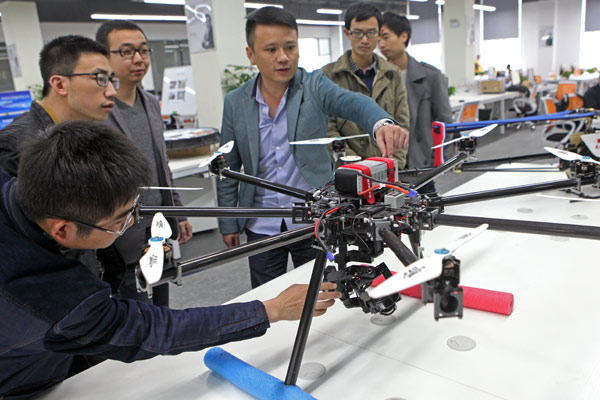 |
|
A drone attracts young people at an innovation base created for startups from Taiwan in Xiamen, Fujian province, in April. CHEN LIJIE/CHINA DAILY |
The irony is not lost on Yeh Chih-yu. Quitting his university mass communication course opened up an exciting, though unconventional route, into communication.
Bored by his course work, Yeh, 34, threw fate to the wind and started from scratch as a floor sweeper for a TV production team. A decade later, he had become a major television director in Taipei. But the urge to try something new was not sated. He yearned for the challenge of an even bigger market than the island. More important, he wanted people on the Chinese mainland to experience what he describes as southern dominated humor.
"Humorous works on the Chinese mainland are dominated by the northern style right now-like crosstalk in Tianjin, and comic skits and errenzhuan, a song-and-dance duet performance popular in Northeast China. So I am trying to let more people know and appreciate the southern style of humor, especially humorous works from Fujian or Taiwan."
With an entrepreneurial wave sweeping the Chinese mainland, an increasing number of people from Taiwan are crossing the Straits to surf new opportunities for startups and ride the tide of mass innovation that a larger market provides.
In addition to high-technology entrepreneurs, some, like Yeh, are bringing a heightened sense of culture, rooted in a shared background and understanding of Chinese tradition, social customs and values.
Yeh's focus on humor is no joke. He believes a shared humor and outlook on life will enable him to make a splash in the commercial world of the Chinese mainland.
"People in southern Fujian and Taiwan speak the same dialect and share a common sense of humor. And I think there are certain advantages in southern humor," he said. "There are numerous puns and plays on words. They pay more attention to details and are better at using irony. Due to our common knowledge of Chinese history and similar life experiences, southern humor could be very attractive to people all over China."
Nearly two years after Premier Li Keqiang introduced the idea of mass innovation and entrepreneurship, there are a growing number of people unleashing their creativity, not only on the Chinese mainland, but also from the other side of the Straits.
According to the government, 4.44 million companies were set up on the Chinese mainland in 2015. By the end of 2015, there were more than 2,500 incubators for high-tech businesses and more than 4,000 innovation bases on the Chinese mainland.
In the coastal city of Xiamen, Fujian province, for example, there are three incubators especially created for startups from Taiwan that have been authorized by the Taiwan Affairs Office of the State Council.
One of them is First Maker, where Yeh's company is based with 100 other startups. Fifty percent of them, and the more than 100 people they accommodate, come from Taiwan.
Yeh, who directed the Chinese version of Duets and China's Got Talent, said the entrepreneurial wave is proving ever more popular.
"The mainland has a much bigger market compared with Taiwan, and the government here provides more favorable policies for new businesses, especially in their starting period. I think more people from Taiwan will come to the Chinese mainland to realize their entrepreneurial dreams," he said.
But his optimism does have a cautionary edge.
"I am afraid that the good basis for peaceful development may be destroyed after Tsai Ing-wen takes office this month. I hope the cross-Straits relationship maintains the status quo."
Also in the communication sector, but a different branch, is Cheng Sheng-lun.
